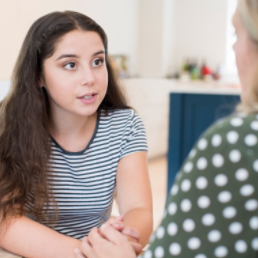
"Just as you are looking out for your child’s physical health during the pandemic, keep an eye on their mental health too," recommends James M. Gillespie, Healthy Minds Fairfax Director and CSB Youth and Family Services Director. He adds, "Having less contact with friends and family and not being able to do enjoyable activities can increase stress and lead to emotional or mental health concerns in children."
If you’re worried about your child, have a talk with them to find out how they are doing. Give them your full attention. Listen carefully, repeat what you heard and ask if you got it right. When they feel heard and understood, they’re more likely to share with you.
Notice what is going on with your child. You know your child best.
Here are some things to look for:
- Becoming more irritable, hyperactive, energetic, fidgety, or aggressive.
- Excessive sadness, fears or worries.
- A steep in drop in grades, getting into trouble at school or not attending school.
- Loss of appetite, significant weight gain or loss, lack of sleep or too much sleep.
- Withdrawal from activities, family, or friends.
- Alcohol or drug use.
- Thoughts of suicide or harming themselves or others – Do not be afraid to ask your child if they are having these thoughts. Your asking will not put those thoughts in their head. Rather, it tells them you care and that you will help keep them safe.
How to get help
Below are several options for you to speak with a mental health professional. Do not worry about making the wrong choice. Every number leads to someone who can help.
- Contact your child’s pediatrician.
- Call your health insurance company or visit their website to search for a behavioral/mental health provider.
- Contact the Fairfax-Falls Church Community Services Board (CSB) at 703-383-8500, weekdays from 9 a.m. to 5 p.m.
- Walk into the CSB’s Merrifield Center (8221 Willow Oaks Corporate Drive, Fairfax, VA 22031) weekdays from 9 a.m. to 5 p.m.
- Contact your child’s school counselor, school public health nurse, social worker, or psychologist.
- Take a free, confidential online mental health screening and practice talking with your child about mental health concerns by taking a free, online Kognito training. [Though these courses are designed for educators, parents can use the same skills in talking with their own children.]
- Visit the CSB or Healthy Minds Fairfax websites to get mental health information and local resources.
If your child is having a mental health crisis, these services are available 24/7
Below are several options for you to speak with a mental health professional. Do not worry about making the wrong choice. Every number leads to someone who can help.
- Call the PRS CrisisLink hotline at 703-527-4077, 1-800-273-8255 or text “CONNECT” to 855-11.
- Call Children’s Regional Crisis Response Children’s Regional Crisis Response (CR2) at 571-364-7390.
- Call CSB Emergency Services at 703-573-5679.
- Bring your child to the CSB’s Merrifield Crisis Response Center, 8221 Willow Oaks Corporate Drive, Fairfax, VA 22031.
- Call 911 if it is a life-threatening emergency. Make sure to notify the operator that it is a psychiatric emergency and ask for an officer trained in crisis intervention or trained to assist people experiencing a psychiatric emergency.
Make the call today – there's never a wrong time to reach out for help for your child.
Contact for news media inquiries: Lisa Flowers, Communications Director, 571-474-5435 (cell) or 703-324-7006 (office).

